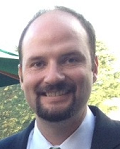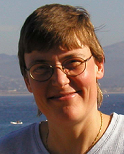The following instructors and speakers have agreed to contribute their expertise to the success of Buck Institute Course:
 |
Michael J. MacCoss, Ph.D. Mike became interested in biomedical applications of mass spectrometry while working in Dr. Patrick Griffin’s protein mass spectrometry lab at Merck Research Laboratories. He obtained a Ph.D. with Professor Dwight Matthews and pursued a postdoc with Professor John R. Yates III. In 2004 he started the MacCoss lab at the University of Washington and it became obvious that while mass spectrometry data could be collected quickly and robustly, the lack of computational tools for the visualization and analysis of these data was a stumbling block. In 2009 he recruited Brendan MacLean with the goal of developing professional quality software tools for quantitative proteomics. Mike has worked closely with the Skyline development team and our outstanding group of laboratory scientists and collaborators to ensure that our software uses analytical approaches that have been thoroughly vetted by the mass spectrometry community. |
|
 |
Brendan MacLean Brendan worked at Microsoft for 8 years in the 1990s where he was a lead developer and development manager for the Visual C++/Developer Studio Project. Since leaving Microsoft, Brendan has been the Vice President of Engineering for Westside Corporation, Director of Engineering for BEA Systems, Inc., Sr. Software Engineer at the Fred Hutchinson Cancer Research Center, and a founding partner of LakKey Software. In this last position he was one of the key programmers responsible for the Computational Proteomics Analysis System (CPAS), made significant contributions to the development of X!Tandem and the Trans Proteomic Pipeline, and created the LabKey Enterprise Pipeline. Since August, 2008 he has worked as a Sr. Software Engineer within the MacCoss lab and been responsible for all aspects of design, development and support in creating the Skyline Targeted Proteomics Environment and its growing worldwide user community. |
|
 |
Ruedi Aebersold, Ph.D. Ruedi is professor at ETH Zurich. His research has focused on the development of new technologies for quantitative proteomics and on applying them to challenging questions of contemporary life science research. In this area, the group has a worldwide standing and has pioneered a number of concepts and technologies that have transformed proteomics. These include the introduction of relative and absolute proteome quantification, the development of open source computational tools for the objective, statistically supported analysis of large proteomic datasets, the development of a method for the determination of the spatial organization of protein complexes and the development of targeted proteomic techniques such as Selected Reaction Monitoring and SWATH-MS.The concept of targeted proteomics has been selected Method of the Year 2012 by the journal Nature Methods. |
|
 |
Michael Bereman, Ph.D. Michael is an assistant professor in the Department of Biological Sciences and a member of the Center for Human Health and the Environment (CHHE) at North Carolina State University in Raleigh, NC. The central focus of his research is to develop innovative, quantitative methodologies to investigate the interplay between environment and genetic factors with respect to human health and disease. The assessment of a vast number of environmental exposures on disease risk remains a critical – yet unfulfilled challenge. His efforts focus on the continued improvements in technology with applications in two key areas: 1) Development of assays to quantify the degree of overall exposure in biological fluids using existing and novel protein modifications; and 2) The elucidation of the impact of various environmental exposures on the etiology of diseases using both human specimens and animal models. Prior to joining NCSU, he held a post-doctoral position in the Department of Genome Sciences at the University of Washington where he focused on instrumentation development, targeted assays for determining protein metabolism, and quality control in proteomics. |
|
 |
Jarrett Egertson, Ph.D. Jarrett is a postdoctoral researcher at the University of Washington Department of Genome Sciences. He works in the MacCoss Lab and primarily focuses on developing new data acquisition methods and software in support of these methods. Jarrett earned his undergraduate degree (B.S. in Molecular, Cell, and Developmental Biology) from UCLA in 2008. While earning his undergraduate degree, Jarrett researched at the Spielberg Family Center for Applied Proteomics at the Cedars-Sinai Medical Center. |
|
 |
Andy Hoofnagle, MD, Ph.D. Andy is an Associate Professor in the Department of Laboratory Medicine at the University of Washington. His laboratory focuses on developing CLIA-certified assays for small molecules using mass spectrometry. They also investigate the function of high density lipoproteins in patients at increased risk for cardiovascular disease and the translation of proteomics technologies into the clinical laboratory. |
|
 |
Lindsay K. Pino is a Ph.D. candidate at the University of Washington’s Department of Genome Sciences in the MacCoss lab. Her research interests include the development of large-scale proteomics assays using data independent acquisition-MS to investigate complex mixtures and applying computational techniques to mine the resulting high-dimensional data. Prior to joining the MacCoss lab, she worked as a research associate at the Broad Institute of MIT and Harvard in Dr. Steve Carr’s Proteomics Platform, where she worked under Dr. Susan Abbatiello to improve the speed and selectivity of targeted proteomics assays using high-field asymmetric waveform ion mobility spectrometry (FAIMS). |
|
 |
Eduard Sabido, Ph.D. Eduard is a biochemist who did his PhD on the characterization of neuropeptide-processing proteases by mass spectrometry at the department of organic chemistry at the University of Barcelona under the supervision of Prof. Ernest Giralt. During those years, Eduard combined organic synthesis with analytical mass spectrometric analyses to pursue the objectives of his thesis and, in parallel, he graduated in Biology and Computational Science. In 2009 Eduard moved to the laboratory of Prof. R. Aebersold at ETH Zurich (Switzerland) to do his post-doctoral research in the framework of a systems biology project on liver proteomics. During those years, he became proficient in many mass spectrometry, including both targeted and untargeted approaches that were applied to address different biological questions. Currently, with a solid background in mass spectrometry, biochemistry, biology and computer science, Eduard Sabidó is leading the Proteomics Unit at the Centre de Regulació Genòmica and the University Pompeu Fabra in Barcelona, Spain. |
|
 |
Birgit Schilling, Ph.D. Birgit joined the Chemistry Core and Mass Spectrometry Laboratory at the Buck Institute for Research on Aging in Novato, CA in 2000 (director: Dr. Gibson). Research projects include investigations of neurodegenerative diseases, aging, cancer, mitochondrial damage, protein posttranslational modifications including acetylation in bacteria, the role of surface glycoconjugates in bacterial pathogenesis etc., but also mass spectrometric method development. Birgit has worked in the field of protein quantitation to assess differential protein expression or changes in posttranslational modifications, particularly using selected reaction monitoring stable isotope dilution mass spectrometry (SRM-SID-MS), and other chemical and metabolic labeling quantitative workflows, i.e., iTRAQ and SILAC technologies. Birgit has participated in large multi-laboratory SRM verification studies taking advantage of Skyline’s platform independent features. In recent years, she has used more and more label free protein quantitation approaches to investigate discovery mass spectrometric data sets (Skyline MS1 Filtering), as well as newer quantitative workflows, such as high resolution data-independent acquisitions (SWATH and PRM). Birgit has co-developed some algorithms for the Skyline Tool Store and she also extensively uses the interactive data sharing features of the Panorama webserver. |
|
 |
Brian Searle Brian Searle is the co-founder and chairman of the board of Proteome Software, Incorporated. Following an undergraduate degree in chemistry from Reed College, Brian was mentored in MS/MS-based proteomics by Ashley McCormack and software development by Mark Turner in Srinivasa Nagalla’s lab at Oregon Health and Science University. In 2004 Brian co-founded Proteome Software with Mark and Ashley to produce and distribute cutting-edge data analysis software for proteomicists. As the owner of Proteome Software, Brian has produced numerous innovations in the analysis of MS/MS-based proteomics data. Brian is a member of the American Society for Mass Spectrometry (ASMS) and served on the board of directors for that organization. Brian also co-founded the Proteome Informatics Research Group of the Association of Biomolecular Resource Facilities (ABRF) society and is active in ABRF committees. In addition to furthering the goals of Proteome Software, Brian is concurrently pursuing a PhD at University of Washington. |
|
 |
Vagisha Sharma Vagisha got involved with proteomics at UC San Diego where she worked with Prof. Vineet Bafna. During that time she built her first tools for visualizing Mass Spectrometry data while working at ActivX Biosciences. Since moving to Seattle Vagisha has worked on Mass Spectrometry pipelines for the Aebersold group at the Institute for Systems Biology, and developed a data management system while at the University of Washington Proteomics Resource and the Yeast Resource Center. She joined the Skyline team in October 2011 where she has been the lead developer for the Panorama Targeted Proteomics Knowledge Base. |
|
 |
Olga Vitek, Ph.D. Olga is a Sy and Laurie Sternberg Associate Professor in the College of Science and the College of Computer and Information Science at Northeastern University. Olga holds a PhD in Statistics from Purdue University. Her group develops statistical methods and algorithms for quantitative proteomics. The methods optimize the experimental design, and ensure accurate and objective interpretation of the resulting large and complex datasets. The tools developed by her group include MSstats, an open-source software for statistical analysis of quantitative shotgun, targeted and data-independent proteomic experiments. |